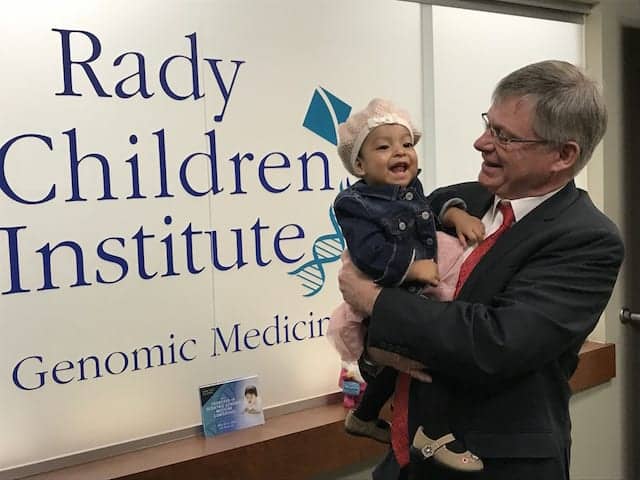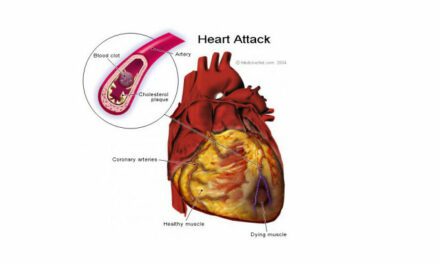This is a companion article to the feature, “Diagnosing Rare Childhood Diseases.”

Stephen Kingsmore, MD, DSc, president and CEO of Rady Children’s Institute for Genomic Medicine, with a Rady Children’s patient.
When searching for the causes of rare or previously unknown diseases, healthcare providers are increasingly interested in utilizing multi-omic datasets, including phenotypic data informed by genomic data. Such information needs to be obtained in an economically sustainable way and made available on an agile, user-friendly platform, so that the data can inform clinical care and lead to better health outcomes.
Supporting such efforts, DNAnexus, Mountain View, Calif, provides a global network for the sharing and management of genomic data and data analysis tools. The DNAnexus Cloud-based platform addresses the challenges of security, scalability, and collaboration for organizations that are pursuing genomic-based approaches to health, in the clinic and in the research lab.
DNAnexus is working with Rady Children’s Institute for Genomic Medicine, San Diego, to support the institute’s whole-genome data analysis pipeline for pediatric care. The work is part of a research program funded by the National Institutes of Health and led by Stephen Kingsmore, MD, DSc, president and CEO of the institute. Over the past couple of years, the institute has begun to expand access to this integrated solution to partner institutions nationwide, fostering a growing genomic database that healthcare providers can access to quickly diagnose rare diseases in children.
The impact of diagnosis by whole-genome sequencing is often life-changing. The team at Rady Children’s routinely tests critically ill children for over 5,000 diseases, including more than 500 diseases for which highly effective treatments are known to exist. For example, if sequencing reveals a mutation in a gene involved in digestion, causing an inability to process a particular nutrient and thereby leading to buildup of a poisonous byproduct, a simple change in diet may limit the effects of the disease. The sooner such a condition can be diagnosed, the less damage the child will suffer. In such cases, minutes matter.
Kingsmore’s vision is to ensure that genome-powered diagnosis is accessible to every child who needs it. Consequently, building a world-class pipeline at a single hospital wasn’t enough. The institute needed a solution that could scale and be deployed at institutions around the world.
DNAnexus is facilitating this goal by providing a flexible and scalable platform for local and distributed sequencing and end-to-end whole-genome analysis. At Rady Children’s, the platform is also being used to securely bank genomic data, connect clinical researchers, and integrate their work with the institute’s existing data and electronic health records.
DNAnexus complies with a number of US statutes and regulations that apply to the collection, storage, and transfer of data originating with individual patients, including the privacy and security rules imposed under the Health Insurance Portability and Accountability Act of 1996, and FDA’s quality system regulation and rules pertaining to electronic records and electronic signatures.1–3 The system is also certified against the international security standards compiled by the International Organization for Standardization, as well as the European Union’s General Data Protection Regulation, which is scheduled to take full effect in May of this year.4–6 The system also complies with the requirements of the EU-US Privacy Shield and Swiss-US Privacy Shield, established in 2016 as a means of protecting the transfer of data among organizations in the United States and Europe.7 In addition, DNAnexus will execute agreements incorporating the standard contractual clauses for transfers of personal data out of the European Union.
In addition to serving healthcare providers such as Rady Children’s, DNAnexus works with global biopharmaceutical companies, genome centers, diagnostic test providers, and consortia that are interested in expanding their translational research programs. Each engagement with a customer is managed by the experienced team at DNAnexus, which includes experts in computational biology and cloud computing.
References
- Health Insurance Portability and Accountability Act of 1996 (P.L. 104-191).
- Quality System Regulation. 21 CFR 820 [online]. Available at: www.ecfr.gov/cgi-bin/text-idx?SID=5f7f190c76a567243b175d9c5b1ece96&mc=true&node=pt21.8.820&rgn=div5. Accessed March 8, 2018.
- Electronic Records; Electronic Signatures. 21 CFR 11 [online]. Available at: www.ecfr.gov/cgi-bin/text-idx?SID=711d4cc4a3dfa0b527c4a80d87119219&mc=true&tpl=/ecfrbrowse/Title21/21cfr11_main_02.tpl. Accessed March 8, 2018.
- Information Technology, Security Techniques, Code of Practice for Information Security Controls. ISO/IEC 27002:2013. Geneva: International Organization for Standardization, 2013. Available at: www.iso.org/standard/54533.html. Accessed March 8, 2018.
- Information Technology, Security Techniques, Information Security Management Systems: Requirements. ISO/IEC 27001:2013. Geneva: International Organization for Standardization, 2013. Available at: www.iso.org/standard/54534.html. Accessed March 8, 2018.
- General Data Protection Regulation. European Union Regulation 2016/679. Official Journal of the European Union, May 4, 2016; L 119/1–88. Available at: http://eur-lex.europa.eu/legal-content/en/txt/pdf/?uri=celex:32016r0679&qid=1490179745294&from=en. Accessed March 8, 2018.
- Privacy Shield Framework [online]. Washington, DC: International Trade Administration, US Department of Commerce, 2017. Available at: www.privacyshield.gov/welcome. Accessed March 8, 2018.





